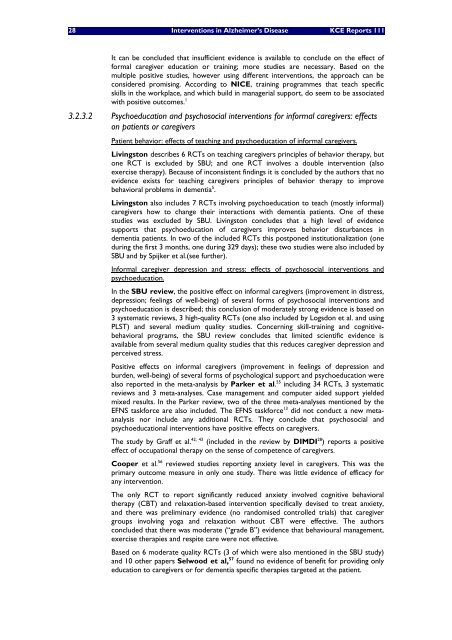Download the full report (112 p.) - KCE
Download the full report (112 p.) - KCE
Download the full report (112 p.) - KCE
You also want an ePaper? Increase the reach of your titles
YUMPU automatically turns print PDFs into web optimized ePapers that Google loves.
28 Interventions in Alzheimer’s Disease <strong>KCE</strong> Reports 111<br />
It can be concluded that insufficient evidence is available to conclude on <strong>the</strong> effect of<br />
formal caregiver education or training; more studies are necessary. Based on <strong>the</strong><br />
multiple positive studies, however using different interventions, <strong>the</strong> approach can be<br />
considered promising. According to NICE, training programmes that teach specific<br />
skills in <strong>the</strong> workplace, and which build in managerial support, do seem to be associated<br />
with positive outcomes. 1<br />
3.2.3.2 Psychoeducation and psychosocial interventions for informal caregivers: effects<br />
on patients or caregivers<br />
Patient behavior: effects of teaching and psychoeducation of informal caregivers.<br />
Livingston describes 6 RCTs on teaching caregivers principles of behavior <strong>the</strong>rapy, but<br />
one RCT is excluded by SBU; and one RCT involves a double intervention (also<br />
exercise <strong>the</strong>rapy). Because of inconsistent findings it is concluded by <strong>the</strong> authors that no<br />
evidence exists for teaching caregivers principles of behavior <strong>the</strong>rapy to improve<br />
behavioral problems in dementia 5 .<br />
Livingston also includes 7 RCTs involving psychoeducation to teach (mostly informal)<br />
caregivers how to change <strong>the</strong>ir interactions with dementia patients. One of <strong>the</strong>se<br />
studies was excluded by SBU. Livingston concludes that a high level of evidence<br />
supports that psychoeducation of caregivers improves behavior disturbances in<br />
dementia patients. In two of <strong>the</strong> included RCTs this postponed institutionalization (one<br />
during <strong>the</strong> first 3 months, one during 329 days); <strong>the</strong>se two studies were also included by<br />
SBU and by Spijker et al.(see fur<strong>the</strong>r).<br />
Informal caregiver depression and stress: effects of psychosocial interventions and<br />
psychoeducation.<br />
In <strong>the</strong> SBU review, <strong>the</strong> positive effect on informal caregivers (improvement in distress,<br />
depression; feelings of well-being) of several forms of psychosocial interventions and<br />
psychoeducation is described; this conclusion of moderately strong evidence is based on<br />
3 systematic reviews, 3 high-quality RCTs (one also included by Logsdon et al. and using<br />
PLST) and several medium quality studies. Concerning skill-training and cognitivebehavioral<br />
programs, <strong>the</strong> SBU review concludes that limited scientific evidence is<br />
available from several medium quality studies that this reduces caregiver depression and<br />
perceived stress.<br />
Positive effects on informal caregivers (improvement in feelings of depression and<br />
burden, well-being) of several forms of psychological support and psychoeducation were<br />
also <strong>report</strong>ed in <strong>the</strong> meta-analysis by Parker et al. 55 including 34 RCTs, 3 systematic<br />
reviews and 3 meta-analyses. Case management and computer aided support yielded<br />
mixed results. In <strong>the</strong> Parker review, two of <strong>the</strong> three meta-analyses mentioned by <strong>the</strong><br />
EFNS taskforce are also included. The EFNS taskforce 13 did not conduct a new metaanalysis<br />
nor include any additional RCTs. They conclude that psychosocial and<br />
psychoeducational interventions have positive effects on caregivers.<br />
The study by Graff et al. 42, 43 (included in <strong>the</strong> review by DIMDI 28 ) <strong>report</strong>s a positive<br />
effect of occupational <strong>the</strong>rapy on <strong>the</strong> sense of competence of caregivers.<br />
Cooper et al. 56 reviewed studies <strong>report</strong>ing anxiety level in caregivers. This was <strong>the</strong><br />
primary outcome measure in only one study. There was little evidence of efficacy for<br />
any intervention.<br />
The only RCT to <strong>report</strong> significantly reduced anxiety involved cognitive behavioral<br />
<strong>the</strong>rapy (CBT) and relaxation-based intervention specifically devised to treat anxiety,<br />
and <strong>the</strong>re was preliminary evidence (no randomised controlled trials) that caregiver<br />
groups involving yoga and relaxation without CBT were effective. The authors<br />
concluded that <strong>the</strong>re was moderate (“grade B”) evidence that behavioural management,<br />
exercise <strong>the</strong>rapies and respite care were not effective.<br />
Based on 6 moderate quality RCTs (3 of which were also mentioned in <strong>the</strong> SBU study)<br />
and 10 o<strong>the</strong>r papers Selwood et al, 57 found no evidence of benefit for providing only<br />
education to caregivers or for dementia specific <strong>the</strong>rapies targeted at <strong>the</strong> patient.

















